Lifestyle
'House of the Dragon' season 2, episode 2: A real no-twin scenario
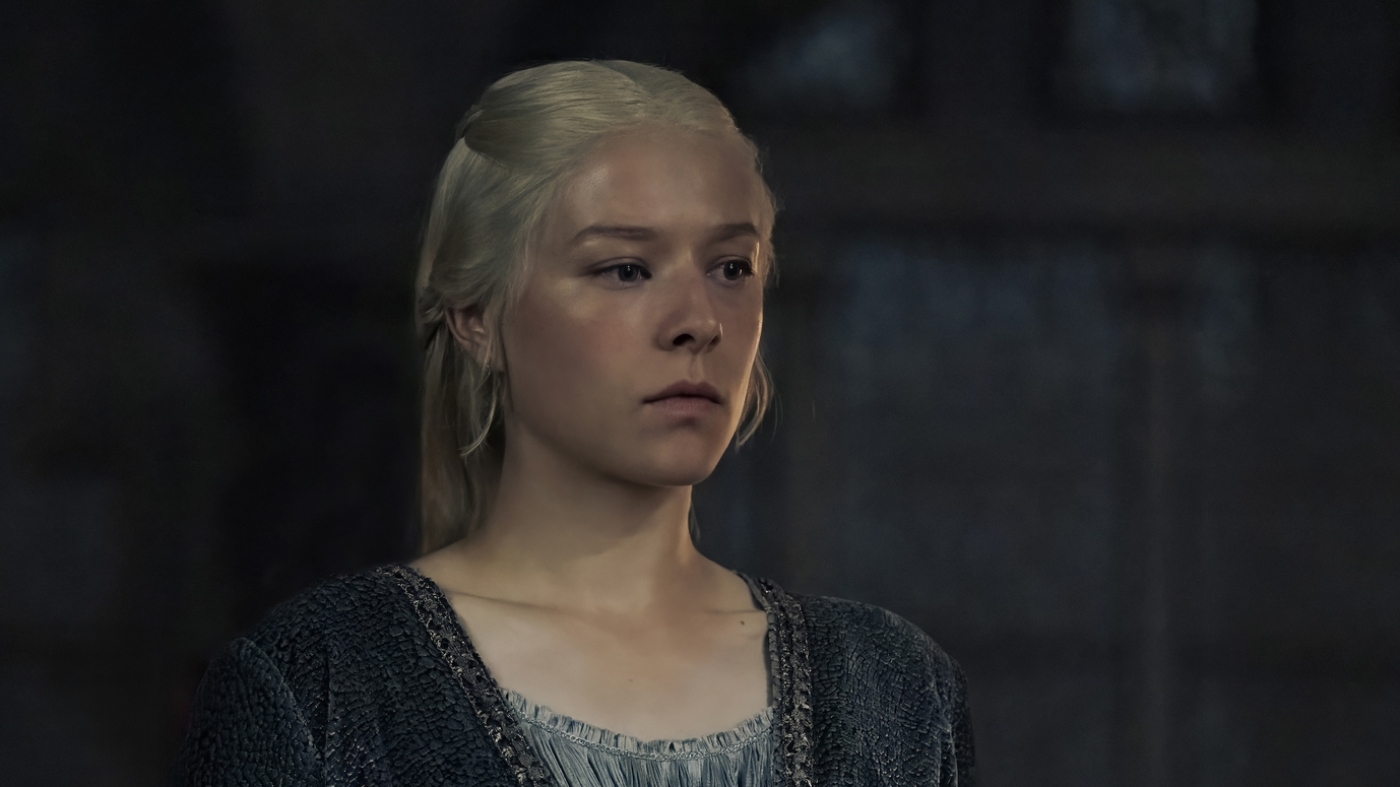
Emma D’Arcy as Rhaenyra.
Theo Whitman/HBO
hide caption
toggle caption
Theo Whitman/HBO
This is a recap of the most recent episode of HBO’s House of the Dragon. It contains spoilers. That’s what a recap is.
Chaos in the Red Keep! The heir to the king is dead! Li’l Jaehaerys’s body – and only his body, as assassins Blood and Cheese have scampered off with his head – has been discovered, and the guards are rounding up everyone. By this logic, their next move should be to run to the now-empty royal barn and shut its doors.
King Aegon is furious, and takes it out on the late King Viserys’s elaborately sculpted facsimile of Old Valyria, the Targaryen ancestral home. Confronted with the destruction of his line’s future, Aegon destroys a representation of its past. Way to live in the now, there, My Grace.
Aemond finds the secret door Blood and Cheese used in the room that he and Criston Cole were plotting in. He then picks up a coin that the show seems to want to invest with symbolic importance, but I rewound several times and still couldn’t make out its design, so your guess is as good as mine.
Alicent is a wreck over the news and blames herself, suggesting that the gods are punishing her for … something she has the good sense not to mention to her father. (Read: The fact that Cole’s White Cloak is more of an Ecru Cloak, these days.) Otto is predictably sanguine: “Some good may yet come of this,” he says. Real goblet-half-full guy, is our Otto.
At the Small Council, Aegon is fuming and foaming, blaming everyone, including Criston Cole, who tells the king that he was “abed,” but not what he was adoing, or awhom he was adoing it with. Lord Larys appears with news that they’ve caught Blood red-handed (and platinum-headed).
Otto suggests Aegon can garner public support and sympathy for himself while turning the people – and the Great Houses who are still undecided — against Rhaenyra. He suggests a funeral procession through the streets of King’s Landing, so that the smallfolk can see Rhaenyra’s cruelty for themselves. That Citadel extension course in marketing is really coming in handy.
Neither Alicent or, especially, Helaena is exactly jazzed about the idea, but they acquiesce. During the procession, the wagon bearing Jaehaerys’s body hits a pothole, because although Aegon II is always announcing Infrastructure Week, nothing ever gets done. The wagon rocks back and forth; Jaehaerys’s tiny body gets jostled. If you, at this point in the proceedings, felt certain that Jaehaerys’s precious little noggin was gonna come loose and bounce down the street like a platinum-haired soccer ball, then A. You are a bad person, and B. Come sit here by me.
Meanwhile, in the Red Keep’s dungeon, Blood hastily confesses that Daemon hired him and a ratcatcher to kill Aemond. But that doesn’t spare him a mace to the face from Aegon. (In the book, Blood suffers thirteen days of torture before being “allowed to die,” so we’re spared that subplot, at least.)
“Mistakes were made.”
On Dragonstone, at the Painted (But Actually Not Painted, Technically Glowing) Table, Rhaenyra hears from her advisors about Jaehaerys, and that she’s being held responsible. She’s legit shocked, but Rhaenys the Always Right isn’t; she casts an accusatory look at Daemon, who avoids her penetrating and insightful gaze. Rhaenyra’s a bit slower on the uptake, but she gets it eventually.

Alicent (Olivia Cooke), Otto Hightower (Rhys Ifans), Aegon II (Tom Glynn-Carney), Criston Cole (Fabien Frankel), Ironrod (Paul Kennedy), and Orwyle (Kurt Egyiawan).
Ollie Upton/HBO
hide caption
toggle caption
Ollie Upton/HBO
In private, Rhaenyra lays into Daemon about the murder. He attempts to shift the blame, and conspicuously refuses to tell her what his specific instructions to Blood and Cheese were, if they couldn’t find Aemond. (You’ll remember the show cut away from that scene before he gave those instructions.) She starts listing his manifold shortcomings – can’t be trusted, thinks only of himself, etc. It’s about damn time; dude’s got more red flags than the Kremlin on May Day.
Daemon … doesn’t take this well. He snarls, hurls his goblet across the room and backs Rhaenyra into a corner, because that has always worked for him. But Rhaenyra’s not having it. She finally sees him for what he is, and lets him know it. He still resents that King Viserys passed him over for Rhaenyra, and has convinced himself that that Viserys chose her because he knew that she could never overshadow him the way Daemon would. Rhaenyra corrects him: Viserys didn’t fear him, he distrusted him, just as she now does. She calls him pathetic; he storms out.
This was a corker of a scene, and one that Emma D’Arcy dominated, even when Daemon was physically threatening Rhaenyra. That’s because Rhaenyra’s written and performed with more nuance than Daemon is, with access to wider range of emotions. As a character, Daemon’s still stuck in Underwritten Perma-SmirkTM mode; here’s hoping Matt Smith gets a bit more to work with as the season plays out.

Daemon (Matt Smith) and Rhaenyra (Emma D’Arcy).
Theo Whitman/HBO
hide caption
toggle caption
Theo Whitman/HBO
Rhaenyra summons Baela to her chambers. Player Scorecard Time: Baela is one of two kids that Daemon had with his previous wife, Laena Velaryon, who last season immolated herself by dragonfire. (Laena’s dragon, Vhagar, is now ridden by Aemond.)
Rhaeyra asks Baela to take her dragon Moondancer and monitor King’s Landing, making sure to fly high enough to avoid their weapons.
We get a few scenes establishing that both Criston Cole and Alicent feel guilty about Jaehaerys’s murder, given that they were both in, let’s say, a compromising position when it happened. They decide to take a break.

A guilt-ridden and sexually frustrated Cole needs to do something with all that pent-up energy, so he lashes out at Ser Arryk; accusations of dereliction of duty get heatedly exchanged. Cole takes Arryk’s insubordination as a flimsy excuse to task him with infiltrating the heavily defended Dragonstone to kill Rhaenyra. What transforms this Mission: Impossible into a Mission: Highly Unlikely, of course, is that Arryk can pose as his twin brother Erryk.
On Dragonstone, Baela and Jacaerys compare their Daddy issues, which is as good a topic as any for these two to bond over, given that they’re betrothed to each other. Jacaerys acknowledges both his dads – his dad-on-paper, dear queer Laenor (“He had a weakness for cake,” which, hell yeah he did!) and his biological dad Harwin Strong (“They called him Breakbones”).
In which an ill-advised attempt is made to give Aemond some depth
We interrupt this episode to remind you that this is a Game of Thrones show on HBO, so yeah anyway here’s your periodic network-mandated Brothel Scene, ya filthy animals.
Aemond is visiting his favorite sex worker, and confesses to her that he regrets killing Lucerys. Now, I suppose this is another example of the show trying to lend its characters a bit of nuance, something I’d normally appreciate. (As I said, Matt Smith’s Daemon desperately needs more layers – that guy’s a big hunk of narrative matzo.)
But this one really doesn’t sit right, because the show has already tried to issue Aemond a pass for that lethal act. You’ll recall that the season 1 finale went out of its way to depict Lucerys’s murder as a wilful, disobedient act by Aemond’s dragon Vhagar. Between that, and the bit in this scene where Aemond whines that Lucerys used to tease him because he was different, it seems like the writers don’t understand the difference between humanizing a villain (a good thing!) and thinking they need to excuse them (very bad!). Enough with the mealy-mouthed pop-psych justifications! Let Aemond be Aemond, show!
We get a quick scene in King’s Landing with Hugh the blacksmith – the guy who asked King Aegon to pay for the weapons and armor he forged, last episode. That payment still hasn’t come, and he’s got a sick kid and a wife who’s finding it harder to put food on the table, due to Queen Rhaenyra’s blockade of the bay. Seems random, I know, but it isn’t – Hugh’s thread will get embroidered into the “Die, You!” Tapestry soon enough.
Cut to: the island of Driftmark, home of House Velaryon. Alyn the sailor, whom we met last episode, greets his brother Addam, a shipwright. They discuss the war, and Addam mentions that Lord Corlys, head of House Velaryon, “owes you. He owes us.” Hunh. How about that. Sure seems like they’re introducing a lot of non-noble randos for us to follow, all of a sudden. I wonder what that’s about. (I mean, I don’t, because I read the book. But you should.)
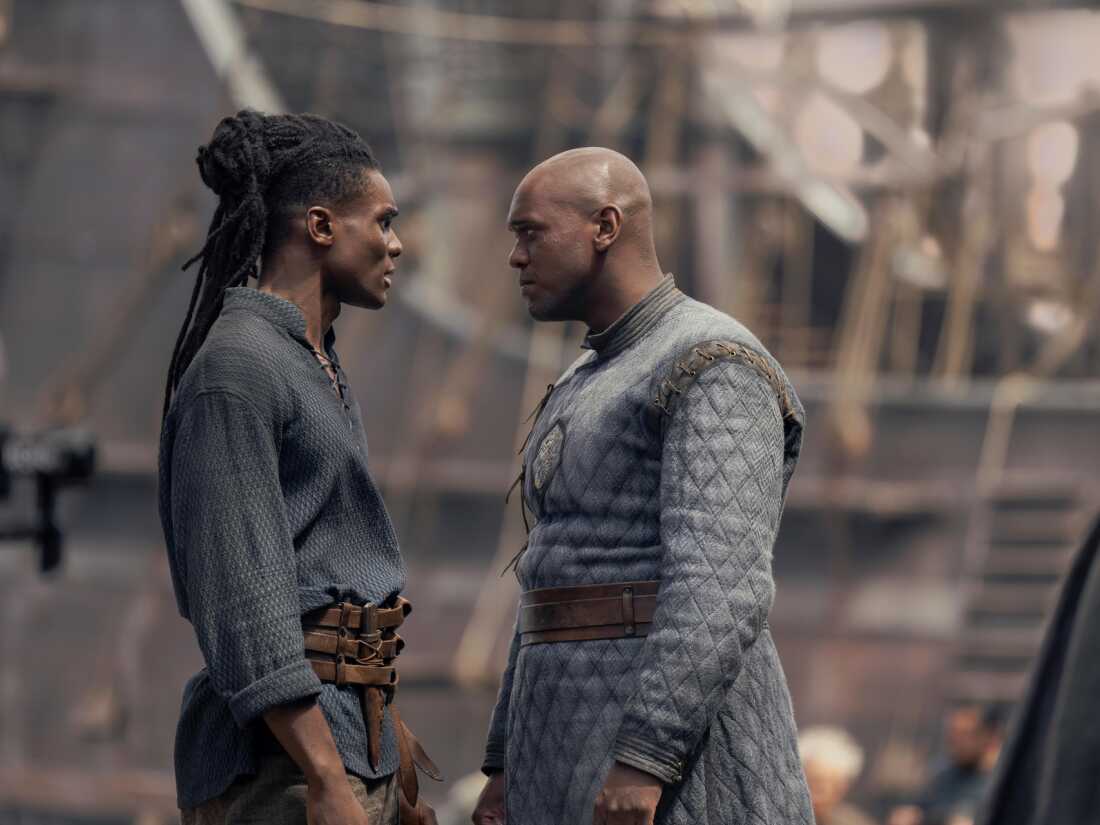
Addam (Clinton Liberty) and his brother Alyn (Abubakar Salim).
Ollie Upton/HBO
hide caption
toggle caption
Ollie Upton/HBO
Cut to: Pillow talk between Corlys and Rhaenys, both of whom worry about Daemon’s ambition. They mention that he’s left Dragonstone on his dragon Caraxes to try to capture the stronghold of Harrenhal, in the Riverlands.
Speaking of Dragonstone: Rhaenyra is pondering over many a quaint and curious volume of forgotten lore in a spiffy new season 2 set. She summons Mysaria from the dungeons, and asks about her role in Jaehaerys’s murder. Mysaria gives Rhaenyra a version of the spiel she gave Daemon last week: I’m a leaf in the wind, I go where the money is, etc. She mentions that Daemon promised her her freedom, but Rhaenyra is unmoved. Mysaria, who knows how to read a room, mentions that the powerful men of the Seven Kingdoms have never seen her as a person. This, as intended, lands with Rhaenyra, who sees a bit of herself in Mysaria – down to the scar she still carries from her own stint as Daemon’s lover.
On the beach of Driftmark, Addam spies Seasmoke, the dragon once ridden by the dearly departed Laenor (who let’s remember is not dead, just … departed). The beast seems restless. Foreshadowing? More like fiveshadowing.
In King’s Landing, we meet still another random, lowborn dude that we’ll see a lot more of in the weeks ahead. (His name’s Ulf; clip and save for your records.) For now, we follow him through the streets until he stumbles across a grisly scene – by order of King Aegon, every ratcatcher in the city has been hanged by the neck. And yes, Cheese is among them, though the birds have pecked enough holes in him that it’d be more accurate to call him Emmentaler at this point.
Let’s give the boy a Hand
In the Red Keep, Otto storms in on Criston Cole and King Aegon, bitterly berating them for ordering the mass execution of innocent citizens. He fumes to a tipsy, uncaring Aegon that the king’s brutal action has just squandered all the goodwill that Jaehaerys’s funeral procession earned them.
It’s good to see Rhys Ifans let off the leash in this scene – gone is Otto’s static pose of sage and sober-minded concern, replaced by the fury of man who can no longer stomach serving someone as weak as Aegon. Otto gets to spit words like “idiot,” “fool,” “thoughtless,” “feckless,” “self-indulgent,” “ill-considered” and “trifling” and throws his whole body into it. For my money, though, it’s Ifans’s hilarious, slow-burn reaction to hearing about Criston Cole’s Erryk vs. Arryk plan that’s the high point of this episode.
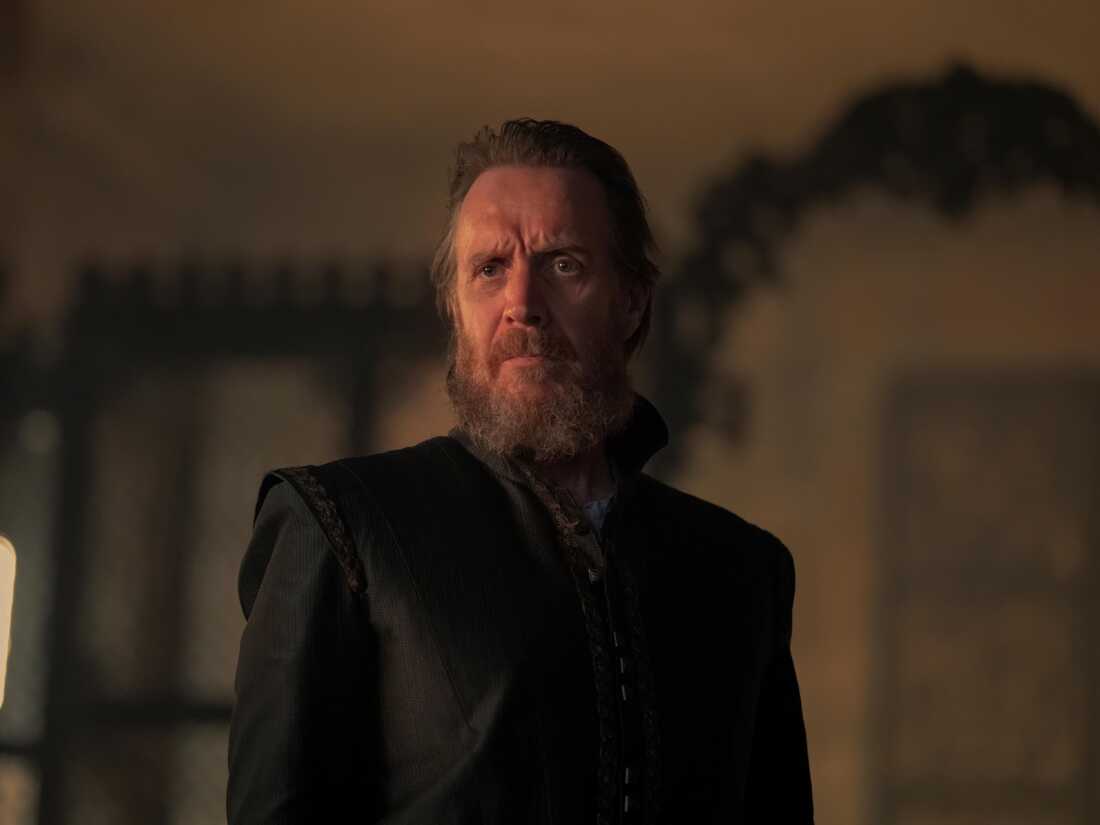
Rhys Ifans as Otto Hightower.
Ollie Upton/HBO
hide caption
toggle caption
Ollie Upton/HBO
“I wish to spill blood, not ink!” whines Aegon, which is a line straight from the book, but it’s a good ‘un. He tells Otto to surrender his status as Hand of the King, and names Criston Cole Otto’s successor. Otto leaves, but not before letting on that he’s always known that Viserys never really named Aegon as his successor. The fact that he accompanies this revelation with a rich, sneering, villainous chuckle? Icing on the cake. That Laenor had a weakness for. That cake.
On Dragonstone, Rhaenyra decides to keep Daemon’s promise and frees Mysaria. On her way down to the docks, however, Mysaria spots a disguised Ser Arryk Cargyll making his way up to the castle. She pauses.
Arryk easily Splinter-Cells his way into the castle (it’s all about timing the guard’s movements and shooting out the security cams). He tells the member of the Queensguard stationed outside her bedchamber – Ser Lorent Marbrand, if you’re scoring at home – that he’ll take over. As soon as Lorent is gone, he enters her room and advances on her.
And promptly gets interrupted by his brother, Ser Erryk Cargyll. They fight.
The funk soul brothers, check ‘em out now
As epic throwdowns go, Cargyllbowl is no Cleganebowl. But then, how could it be? That matchup was looming for years, and it pitted one character we’d come to know enough to dearly love against another we knew enough to dutifully loathe.
By contrast, these beardy bros haven’t clocked nearly enough screentime to truly register, separately or together. Still, it’s a solid fight, and it places Rhaenyra in more danger than the book version does. But ultimately Erryk defeats Arryk. The victory is fleeting, however, as a remorseful Erryk throws himself on his sword. Which is stupid and pointless but, you have to admit, metal AF.
Back in the Red Keep, Otto is doing the Seven Kingdoms equivalent of packing up his desk into a cardboard box from the supply closet – you know: picture frames, succulents, a couple of Dilbert strips. He’s still angry, cursing Aegon and Criston for their foolishness. Alicent agrees – mostly. Her eyes dart guiltily as she avers that Criston, at least, is loyal, so you know … there’s that.

Otto says he’ll return to Oldtown, home of House Hightower, where Alicent’s youngest son Daeron awaits.
WHOOP WHOOP WHOOP NEW CHARACTER ALERT WHOOP WHOOP WHOOP. No, you’re not crazy. This is the first we’ve heard mention of Daeron on the show. Daeron’s a teenager who’s been in Oldtown acting as a squire to the head of House Hightower. He’s got a (very young) dragon named Tessarion, and they’ve both got a role to play in this story. Dunno if he’s gonna show up this season, but at least we know he officially exists in the world of this show, now.
Alicent urges Otto not to go to Oldtown, but to Highgarden, home of House Tyrell. (Odds of Daeron showing up this season … shrinking … ) She assures Otto that she can talk some sense into Aegon, and he seems to believe her, because clearly neither one of them has been watching this show.
In fact, when Alicent does try to go to Aegon’s chambers for some of that sense-talking, she finds him weeping – alone, grieving, frightened, caving under the pressure. She leaves.
In her bedchamber, Criston is waiting.
Parting Thoughts
- Rhaenyra, Rhaenys, Rhaena. Daemon, Aemond. Jacaerys, Jaehaerys. And now, with this episode: Daemon, Daeron. I know George R.R. Martin has pointed to English history – all those Edwards and Henrys – to justify so many characters having such maddeningly similar names. But then a thing like Daemon-Daeron comes along and it starts to seem like he’s just goading us.
- House of the Dragon focuses on the noblemen and noblewomen of the Seven Kingdoms. But that means it’s missing something Game of Thrones had in spades – the perspective of the commoner. Don’t get me wrong, all this palace intrigue is fun. But I’ve been missing the earthiness and ego-puncturing humor of characters like Bronn and Davos and Sandor. This episode seems intent on course-correcting that, tossing Alyn and Addam and Hugh and Ulf in the mix.
- I know I’ve already praised it, but Rhys Ifans’s incredulous take upon hearing Cole’s plan was iconic. Jack Benny-level. He should take it on the road, if Westeros has a vaudeville circuit.
- How we feeling about the pacing, this season? I figured we’d be in the thick of it by now. But then Alyn’s still all “War is coming,” and I realized I’m comparing the book, which is a faux-historical account, to a dramatized TV series, which seems in no particular hurry to get to the wildfire factory.

Lifestyle
DTLA has a new theater — inside a fake electrical box

By day, you’d be forgiven for walking past the newest theater in downtown L.A.
It isn’t hidden in an alley or obscured via a nameless door. No, this performance space is essentially a theater in disguise, as it’s designed to look like an electrical box — a fabrication so real that when artist S.C. Mero was installing it in the Arts District, police stopped her, concerned she was ripping out its copper wire. (There is no copper wire inside this wooden nook.)
Open the door to the theater, and discover a place of urban enchantment, where a red velvet door and crimson wallpaper beckon guests to come closer and sit inside. That is, if they can fit.
With a mirror on its side and a clock in its back, Mero’s creation, about 6 feet tall and 3 feet deep yet smaller on its interior, looks something akin to an intimate, private boudoir — the sort of dressing room that wouldn’t be out of place in one of Broadway’s historic downtown theaters. That’s by design, says Mero, who cites the ornately romanticized vibe and color palette of the Los Angeles Theatre as prime inspiration. Mero, a longtime street artist whose guerrilla art regularly dots the downtown landscape, likes to inject whimsy into her work: a drainage pipe that gives birth, a ball pit for rats or the transformation of a dilapidated building into a “castle.” But there’s just as often some hidden social commentary.
With her Electrical Box Theatre, situated across from the historic American Hotel and sausage restaurant and bar Wurstküche, Mero set out to create an impromptu performance space for the sort of experimental artists who no longer have an outlet in downtown’s galleries or more refined stages. The American Hotel, for instance, subject of 2018 documentary “Tales of the American” and once home to the anything-goes punk rock ethos of Al’s Bar, still stands, but it isn’t lost on Mero that most of the neighborhood’s artist platforms today are softer around the edges.
Ethan Marks inside S.C. Mero’s theater inside a fake electrical box. The guerrilla art piece is near the American Hotel.
(Kayla Bartkowski / Los Angeles Times)
“A lot of galleries are for what can sell,” Mero says. “Usually that’s paintings and wall art.”
She dreamed, however, of an anti-establishment place that could feel inviting and erase boundaries between audience and perfomer. “People may be intimidated to get up on a stage or at a coffee shop, but here it’s right on street level.”
It’s already working as intended, says Mero. I visited the box early last week when Mero invited a pair of experimental musicians to perform. Shortly after trumpeter Ethan Marks took to the sidewalk, one of the American Hotel’s current residents leaned out his window and began vocally and jovially mimicking the fragmented and angular notes coming from the instrument. In this moment, “the box,” as Mero casually refers to it, became a true communal stage, a participatory call-and-response pulpit for the neighborhood.

Clown Lars Adams, 38, peers out of S.C. Mero’s theater inside a fake electrical box. Mero modeled the space off of Broadway’s historic theaters.
(Kayla Bartkowski / Los Angeles Times)
A few days prior, a rideshare driver noticed a crowd and pulled over to read his poetry. He told Mero it was his first time. The unscripted occurrence, she says, was “one of the best moments I’ve ever experienced in making art.”
“That’s literally what this space is,” Mero says. “It’s for people to try something new or to experiment.”
Marks jumped at the chance to perform for free inside the theater, his brassy freewheeling equally complementing and contrasting the sounds of the intersection. “I was delighted,” he says, when Mero told him about the stage. “There’s so much unexpectedness to it that as an improviser, it really keeps you in the moment.”
A downtown resident for more than a decade, Mero has become something of an advocate for the neighborhood. The area arguably hasn’t returned to its pre-pandemic heights, as many office floors sit empty and a string of high-profile restaurant closures struck the community. Mero’s own gallery at the corner of Spring and Seventh streets shuttered in 2024. Downtown also saw its perception take a hit last year when ICE descended on the city center and national media incorrectly portrayed the hood as a hub of chaos.

Artist S.C. Mero looks into her latest project, a fake electrical box in the Arts District. Mero has long been associated with street art in the neighborhood.
(Kayla Bartkowski / Los Angeles Times)
“A lot has changed in the 13 years when I first got down here,” Mero says. “Everybody felt like it was magic, like we were going to be part of this renaissance and L.A. was going to have this epicenter again. Then it descended. A lot of my friends left. But I still see the same beauty in it. The architecture. The history. Downtown is the most populous neighborhood in all of L.A. because it belongs to everybody. It’s everybody’s downtown, whether they love it or not. And I feel we are part of history.”
Art today in downtown ranges from high-end galleries such as Hauser & Wirth to the graffiti-covered towers of Oceanwide Plaza. Gritty spaces, such as Superchief Gallery, have been vocal about struggles to stay afloat. Mero’s art, meanwhile, remains a source of optimism throughout downtown’s streets.
At Pershing Square, for instance, sits her “Spike Cafe,” a mini tropical hideaway atop a parking garage sign where umbrellas and finger food props have become a prettier nesting spot for pigeons. Seen potentially as a vision for beautification, a contrast, for instance, from the nature intrusive barbs that aim to deter wildlife, “Spike Cafe” has become a statement of harmony.
Elsewhere, on the corner of Broadway and Fourth streets, Mero has commandeered a once historic building that’s been burned and left to rot. Mero, in collaboration with fellow street artist Wild Life, has turned the blighted space into a fantastical haven with a knight, a dragon and more — a decaying castle from a bygone era.
“A lot of times people are like, ‘I can’t believe you get away with that!’ But most people haven’t tried to do it, you know?” Mero says. “It can be moved easily. It’s not impeding on anyone. I don’t feel I do anything bad. Not having a permit is just a technicality. I believe what I’m doing is right.”

Musician Jeonghyeon Joo, 31, plays the haegeum outside of S.C. Mero’s latest art project, a theater in a faux electrical box.
(Kayla Bartkowski / Los Angeles Times)
After initially posting her electrical box on her social media, Mero says she almost instantly received more than 20 requests to perform at the venue. Two combination locks keep it closed, and Mero will give out the code to those she trusts. “Some people want to come and play their accordion. Another is a tour guide,” Mero says.
Ultimately, it’s an idea, she says, that she’s had for about a decade. “Everything has to come together, right? You have to have enough funds to buy the supplies, and then the skills to to have it come together.”
And while it isn’t designed to be forever, it is bolted to the sidewalk. As for why now was the right time to unleash it, Mero is direct: “I needed the space,” she says.
There are concerns. Perhaps, Mero speculates, someone will change the lock combination, knocking her out of her own creation. And the more attention brought to the box via media interviews means more scrutiny may be placed on it, risking its confiscation by city authorities.
As a street artist, however, Mero has had to embrace impermanence, although she acknowledges it can be a bummer when a piece disappears in a day or two. And unlike a gallerist, she feels an obligation to tweak her work once it’s out in the world. Though her “Spike Cafe” is about a year old, she says she has to “continue to babysit it,” as pigeons aren’t exactly known for their tidiness.
But Mero hopes the box has a life of its own, and considers it a conversation between her, local artists and downtown itself. “I still think we’re part of something special,” Mero says of living and working downtown.
And, at least for now, it’s the neighborhood with arguably the city’s most unique performance venue.
Lifestyle
A glimpse of Iran, through the eyes of its artists and journalists

Understanding one of the world’s oldest civilizations can’t be achieved through a single film or book. But recent works of literature, journalism, music and film by Iranians are a powerful starting point. Clockwise from top left: The Seed of the Sacred Fig, For The Sun After Long Nights, Cutting Through Rocks, It Was Just an Accident, Martyr!, and Kayhan Kalhor.
NEON; Pantheon; Gandom Films Production; NEON; Vintage; Julia Gunther for NPR
hide caption
toggle caption
NEON; Pantheon; Gandom Films Production; NEON; Vintage; Julia Gunther for NPR
Few Americans have had the opportunity to visit or explore Iran, an ethnically diverse nation of over 90 million people which has been effectively shut off from the United States since the Iranian revolution of 1979. Now, with a U.S. and Israeli-led war on Iran underway, the ideas, feelings and opinions of Iranians may feel less accessible. However, some recent books, films and music made by artists and journalists in Iran and from the Iranian diaspora can help illuminate this ancient culture and its contemporary politics.
These suggestions are just a starting point, of course — with an emphasis on recent works made by Iranians themselves, rather than by outsiders looking in.
Books
For the Sun After Long Nights: The Story of Iran’s Women-Led Uprising, by Fatemeh Jamalpour and Nilo Tabrizy
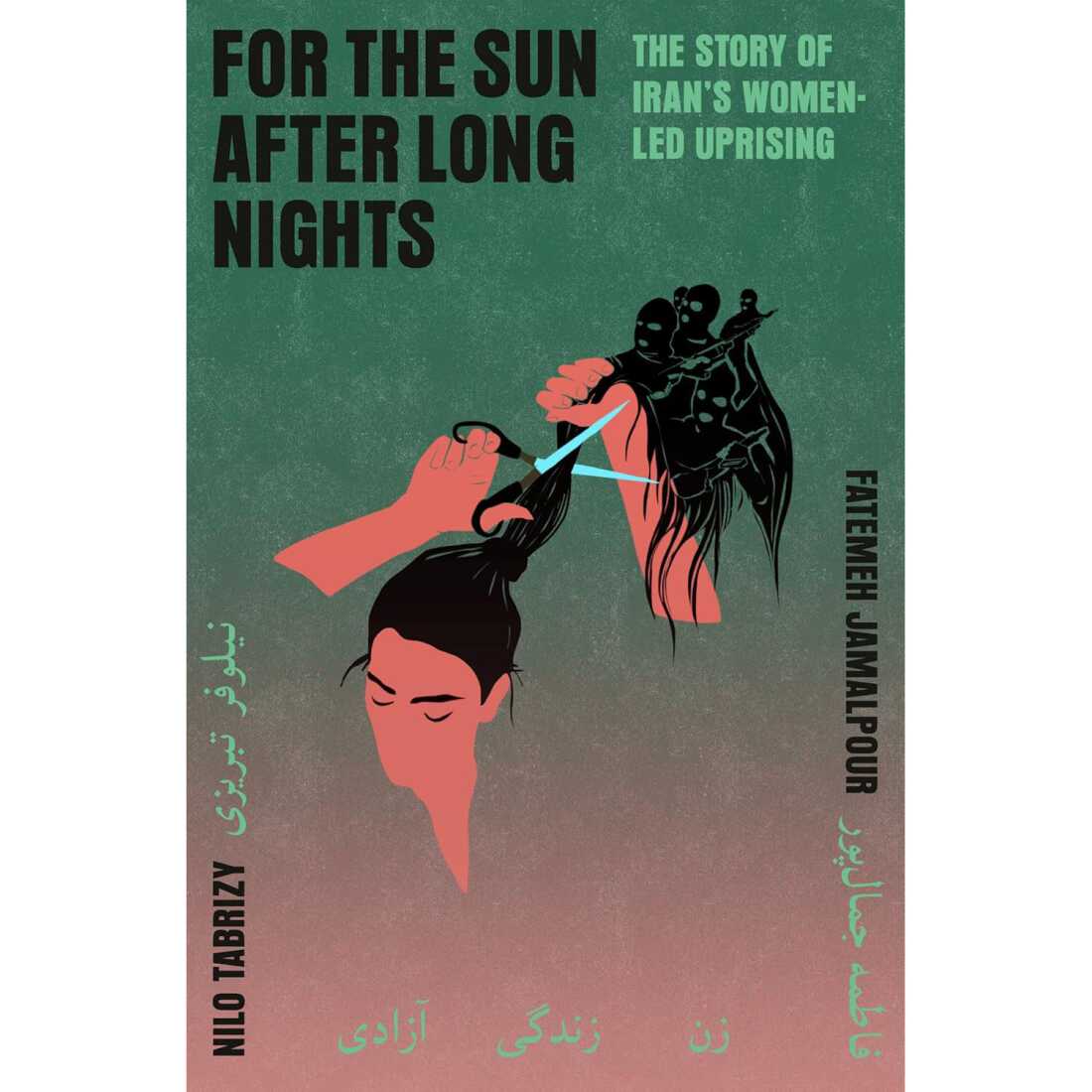
There are quite a few excellent titles that deconstruct the history of Iran from ancient times through the rule of the Pahlavi Dynasty to the Iranian Revolution. But there are far fewer books that help us understand the Iran of 2026 and the people who live there now. One standout is the National Book Award-nominated For the Sun After Long Nights: The Story of Iran’s Women-Led Uprising by journalists Fatemeh Jamalpour and Nilo Tabrizy, which chronicles — almost in real time — the Woman, Life, Freedom movement that began in 2022, during which Jamalpour was working secretly as a journalist in Tehran. In 2024-25, Jamalpour (who is now living in exile in the U.S.) and I spent a year together at the University of Michigan’s Knight-Wallace fellowship for journalists; her insights into contemporary Iran are among the best.
Gold, by Rumi, translated by Haleh Liza Gafori

If Americans are familiar with Persian poetry at all, it may well be through popular “translations” of the 13th-century Sufi poet Jalaluddin Rumi done by the late American poet Coleman Barks, who neither read nor spoke the Persian language and detached the works of Molana (“our master”), as Iranians call him, of references to Islam. (Instead, Barks “interpreted” preexisting English translations.)
In 2022, Iranian-American poet, performance artist and singer Haleh Liza Gafori offered the first volume of a corrective, in the form of fresh Rumi translations that are at once accessible, deeply contemplative and immediate. A second volume, Water, followed last year.
Martyr!: A Novel, by Kaveh Akbar
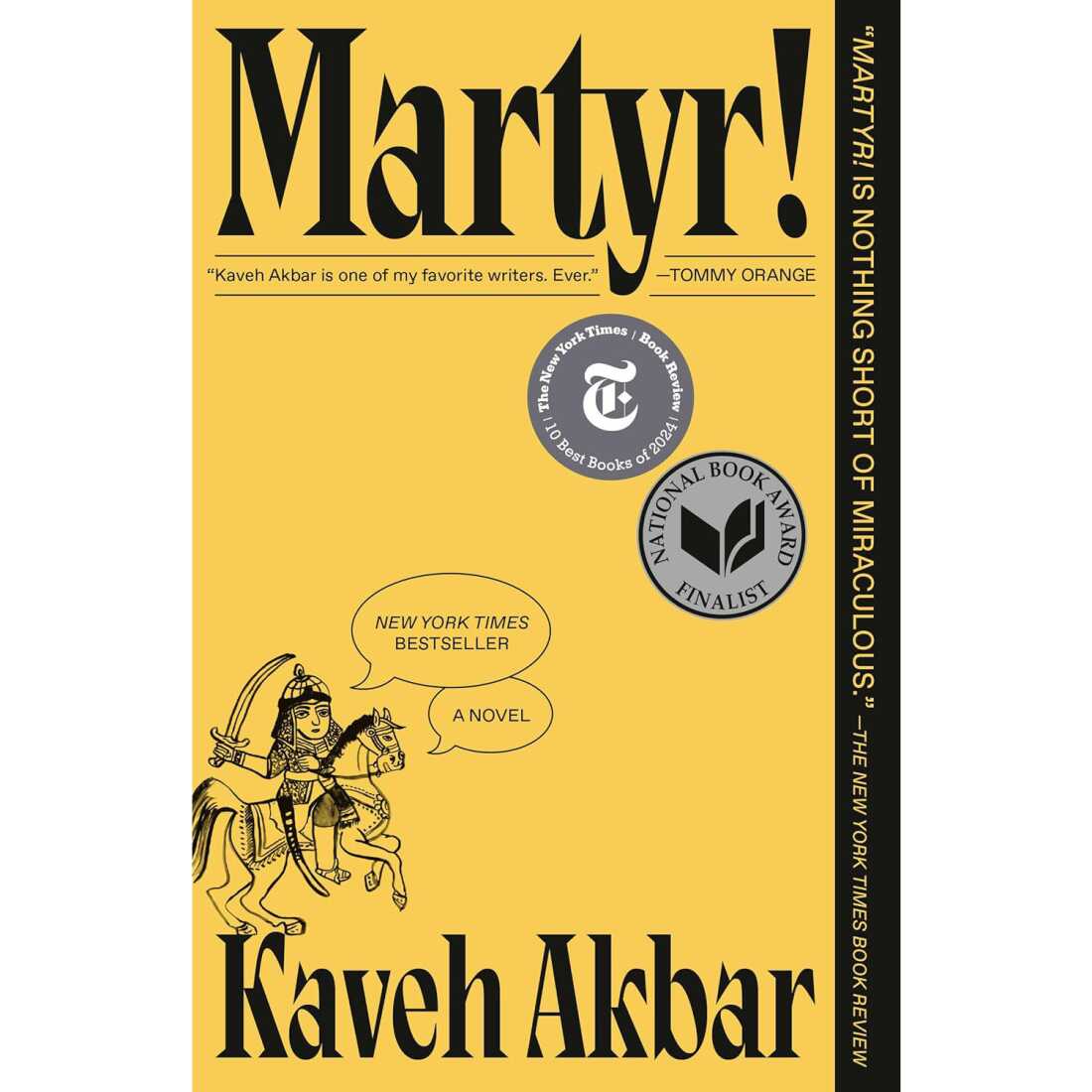
This 2024 debut novel by Kaveh Akbar, the poetry editor at The Nation, is an unflinching tour-de-force bursting with wit and insight into the complications of diaspora, the nature of identity in a post-War on Terror world and the inter-generational impact of the 1979 Revolution on Iranians. The protagonist, the Iran-born but American-raised Cyrus Shams, has struggled with addiction, depression and insomnia his whole life, and is trying his best to make sense of a world at the “intersection of Iranian-ness and Midwestern-ness.” As with so many other of the titles here, fiction and fact are woven together: the story centers around the true story of the U.S. downing an Iranian passenger plane in 1988 during the Iran-Iraq war.
The Stationery Shop: A Novel, by Marjan Kamali

Marjan Kamali’s 2019 love story is the wistful tale of a young woman named Roya and an idealistic activist named Bahman, who meet cute in a Tehran store in the 1950s, but whose planned marriage falls apart due to turmoil both familial and political, as Iran’s democratically elected government falls in a U.S.-British lead coup that ends with the installation of the Shah. Roya flees to the U.S. for a fresh start, but the two reunite in 2013, wondering: what if life had spun out in a different direction?
Movies
Coup 53
This 2019 documentary directed by Iranian film maker Taghi Amirani and co-written by Walter Murch recounts Operation Ajax, in which the CIA and Britain’s MI6 engineered the removal of Mohammad Mossadegh, Iran’s democratically elected prime minister, and installed a friendly ruler, Shah Mohammad Reza Pahlavi, in his place. (The Shah was ousted in the 1979 revolution.) As Fresh Air critic John Powers noted in his review, “What emerges first is the backstory of the coup, which like so much in the modern Middle East is predicated on oil. Shortly after the black gold was discovered in early 20th century Iran, a British oil company now known as BP locked up a sweetheart deal for its exploitation. Iran not only got a mere 16% of the oil money before British taxes, but the books were kept by the British — and the Iranians weren’t allowed to see them.”
YouTube
Cutting Through Rocks
Sara Khaki and Mohammadreza Eyni’s film Cutting Through Rocks is up for an Oscar this season after premiering at the 2025 Sundance Film Festival. This inspiring documentary follows Sara Shahverdi — a divorced, childless motorcyclist — as she campaigns to become the first woman elected to the city council of her remote village, and who dreams of teaching girls to ride and to end child marriage.
YouTube
It Was Just an Accident
The latest film from acclaimed director Jafar Panahi — who has officially been banned from making films in Iran — is 2025’s It Was Just an Accident. Panahi, who has been jailed multiple times for his work and was recently sentenced again in absentia, has said in interviews that his inspiration for this brutal – and shockingly funny – thriller was people he met while in prison: an auto mechanic named Vahid finds himself face-to-face with the man who he is fairly certain was his torturer in jail, and eventually assembles other victims to try to confirm his suspicions. Fresh Air critic Justin Chang called It Was Just an Accident “a blast of pure anti-authoritarian rage.”
YouTube
The Seed of the Sacred Fig
This 2024 thriller — shot in secret by director Mohammad Rasoulof — centers on a family whose father, Iman, is appointed as an investigating judge in Tehran. But it soon becomes clear that his job has nothing to do with actually investigating. Iman, his wife, and two daughters come to suspect each other in our age of mass surveillance, as the city streets below erupt into the real-life Woman, Life, Freedom protests.
YouTube
Music
Kayhan Kalhor
One of the primary ambassadors of Persian classical music has been the composer and kamancheh (an Iranian bowed-instrument) virtuoso Kayhan Kalhor. Although music, like poetry, has been central to Iranian culture for centuries, all kinds of music were initially banned after the 1979 revolution. Since then, however, Iranian classical musicians have ridden many looping cycles of official condemnation, grudging tolerance, censorship and attempts at co-option by the regime.
Despite those difficulties, Kalhor has built a thriving career both inside Iran and abroad, including winning a Grammy Award as part of the Silkroad Ensemble and earning three nominations as a solo artist. Back in 2012, I invited him to our Tiny Desk to perform solo. “Didn’t know I could have goosebumps for 12 minutes straight,” a YouTube commenter recently wrote; I couldn’t put it any better.
YouTube
Saeid Shanbehzadeh
Among Iran’s 92 million people, about 40% of come from various ethnic minorities, including Azeris, Kurds and Armenians among many others. One of the most fascinating communities is the Afro-Iranians in the Iranian south, many of whose ancestors were brought to Iran as enslaved people from east Africa. Multi-instrumentalist and dancer Saeid Shanbehzadeh, who traces his ancestry to Zanzibar, celebrates that heritage with his band, and specializes in the Iranian bagpipe and percussion.
YouTube
The underground metal scene
Despite ongoing restrictions on music — including the continued ban on female singers performing in mixed-gender public settings — Iran is home to a thriving underground scene for metal and punk. Though it’s fictional, Farbod Ardebelli’s 2020 short drama Forbidden to See Us Scream in Tehran — which was secretly filmed in Tehran, with the director giving instructions remotely from the U.S. via WhatsApp — gives a flavor of that real-life scene and the dangers those artists face.
YouTube
Lifestyle
Sen. Thom Tillis Rips Kristi Noem, Compares ICE Killings To Dog She Killed

Sen. Tillis To Kristi Noem
ICE Killings Are Like Dog You Killed
Published
Fireworks on Capitol Hill … Sen. Thom Tillis ripped into DHS Secretary Kristi Noem during a congressional hearing … comparing American citizens killed by immigration agents to a dog she killed.
Check out the video … the Republican Senator from North Carolina says Noem has shown terrible leadership and decision-making as Trump‘s DHS Secretary.
AP
Tillis says the killings of Renee Good and Alex Pretti in Minneapolis by ICE and Border Patrol remind him of a passage from Noem’s book … where she recalls killing a dog she brought on a hunting trip.
Noem said the 14-month-old dog, Cricket, was misbehaving … so she led the dog to a gravel pit and shot her.
X/@DHSgov
Sen. Tillis told her straight up … “Those are bad decisions made in the heat of the moment. Not unlike what happened up in Minneapolis. We’re an exceptional nation, and one of the reasons we’re exceptional is we expect exceptional leadership. And you’ve demonstrated anything but that.”
-

 World7 days ago
World7 days agoExclusive: DeepSeek withholds latest AI model from US chipmakers including Nvidia, sources say
-

 Massachusetts7 days ago
Massachusetts7 days agoMother and daughter injured in Taunton house explosion
-

 Denver, CO7 days ago
Denver, CO7 days ago10 acres charred, 5 injured in Thornton grass fire, evacuation orders lifted
-

 Louisiana1 week ago
Louisiana1 week agoWildfire near Gum Swamp Road in Livingston Parish now under control; more than 200 acres burned
-

 Oregon5 days ago
Oregon5 days ago2026 OSAA Oregon Wrestling State Championship Results And Brackets – FloWrestling
-

 Florida3 days ago
Florida3 days agoFlorida man rescued after being stuck in shoulder-deep mud for days
-

 Maryland3 days ago
Maryland3 days agoAM showers Sunday in Maryland
-

 Wisconsin2 days ago
Wisconsin2 days agoSetting sail on iceboats across a frozen lake in Wisconsin


















